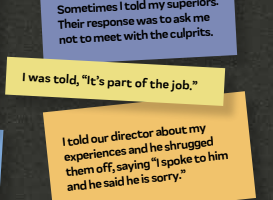
Ditching “Boys Will Be Boys”
The stories in the media have left me wondering about all the men in my life. “Am I safe with you—not just physically, but existentially? Do you see me as fully human, created in the image of God, like you?”
The fact that teenage girls are sitting in class wondering the same thing breaks my heart.
Here are some further excerpts from the student newspaper article by Abby Fischer that Sarah Seltzer mentions:
- “Other highlights of the conversation include multiple statements that began, ‘Rape is bad, but’ and ‘you can overcome abuse, but you can’t overcome having your reputation squashed.’ Now, before you jump to conclusions about the boys who made the aforementioned comments—before you call them insensitive or sexist—let me say something in their defense.
- Our culture fosters a world in which women are afraid to come forward when attacked, and men are afraid to believe the few who do. The unfortunate reality is that we can’t expect all boys and men to empathize with victims of sexual assault because they aren’t taught from the get-go that women are their equals.”
Abby goes on to describe how futile she and her female friends thought the discussion had been—“They’ll never believe us and they’ll never understand”— while the boys, talking among themselves, described the class discussion as “ridiculous.”
What experiences and messages do young boys need so that they can grow into 16-year olds who think the experience of being raped is worse than the reputational consequences of being accurately accused of rape?
Girls and women are instructed protect ourselves from assault by “making smart choices”—about clothing, drinking, walking. But boys’ behavior is not girls’ responsibility. What will it take to put the onus on boys and men to stop assaulting?
Here are some challenges to the language we use:
“Boys Will Be Boys.” Parents, educators and caregivers need to stop giving boys a pass. Don’t accept behavior from little boys that you would not accept from little girls.
“Stop Crying. Man Up.” With this instruction, we confiscate an important part of a boy’s humanity and give him clear messages about masculinity. Boys —and men— need full access to tender emotions.
“Boys Won’t Read Books about Girls.” One way that we learn empathy is by hearing stories of “the other”–people different from ourselves. Books with girl protagonists give boys a chance to see girls in their full humanity, particularly important in a culture where media images all around us portray women as objects.
Julie Sissman is an organization and leadership consultant.



